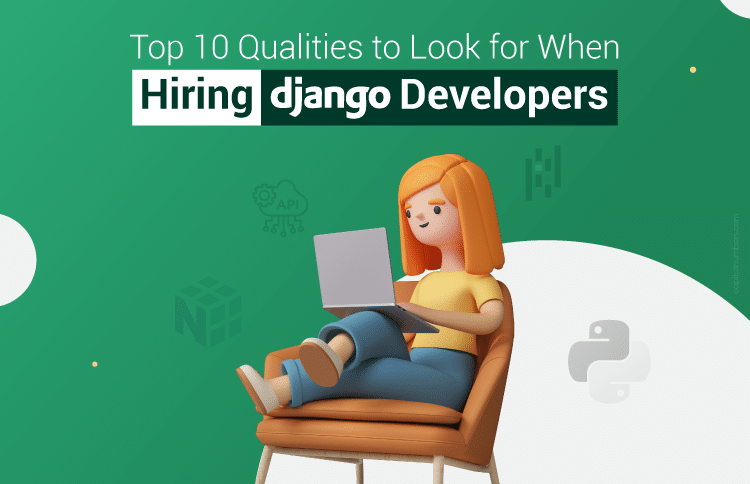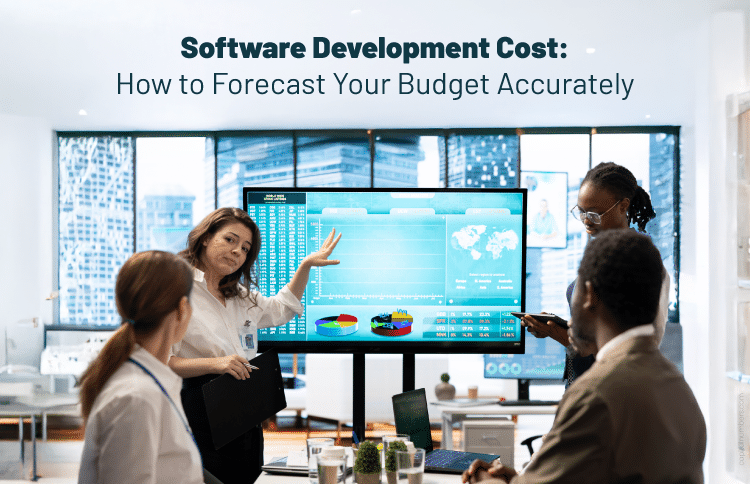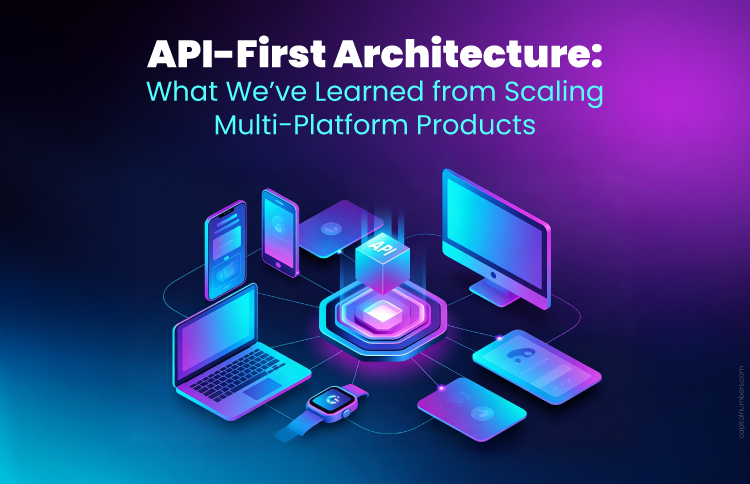Top 10 Qualities to Look for When Hiring Django Developers
Table of Contents
When hiring Django developers, it’s vital to assess their technical proficiency and their capacity to create scalable, high-performance solutions. Look for developers with a deep understanding of Python, the backbone of Django, and a strong grasp of Django’s core features, including its MTV (Model-Template-View) architecture, ORM (Object-Relational Mapping), and Admin interface. This expertise ensures they can efficiently design, build, and manage complex, data-driven web applications.
Also, make sure the developers are skilled in Django Rest Framework (DRF) for API development, have experience with database management, and follow security best practices to safeguard your application. Their ability to optimize performance, work within Agile frameworks, and communicate effectively with technical and non-technical stakeholders is equally important for the success of your project.
Eager to know more? Keep reading to uncover the essential skills to look for when hiring Django developers.
1. Strong Proficiency in Python
When hiring Django developers, it’s essential to first assess their expertise in Python, the foundational language behind Django. A skilled Django backend developer must be able to write code and solve real-world problems with it.
They should have mastery of Python fundamentals, including:
- Core data structures like lists, dictionaries, sets, and tuples
- Object-Oriented Programming (OOP) concepts to create modular, reusable code
- Exception handling and error management to build stable, fault-tolerant systems
Also, they should be familiar with commonly used Python libraries, such as:
Pandas:
This library is great for handling and analyzing structured data. Django developers use it for tasks like creating reports, managing data in dashboards, or preparing backend logic for APIs that deal with large datasets.
Requests:
Requests make it easy to interact with external APIs. Django developers use them to fetch data from other services, such as payment systems, CRMs, or social media platforms, and integrate it into their applications.
NumPy:
Although Django is a web framework, many Django applications must process numbers and perform calculations. NumPy is used for handling arrays and complex math, especially in analytics or AI-driven apps.
Built-in modules like json and datetime:
These core Python libraries help with tasks like formatting data, converting time zones, and managing dates and times in your application. Django developers use them to handle data parsing, time-based logic, and API responses.
2. Deep Understanding of Core Django Concepts
You should ensure that your developers have a strong understanding of Django’s core technical concepts. An expert Django developer will be well-versed in the following areas:
Django MVC (MTV) Architecture
The developer should understand how Django follows the Model-Template-View (MTV) pattern to separate concerns in the application. This pattern helps manage complexity, making Django ideal for developing complex web apps.
Django ORM (Object-Relational Mapping)
Django’s ORM is central to interacting with databases. Developers should be able to:
- Write optimized queries for efficient data retrieval and storage
- Perform database migrations without issues
- Handle different database relationships such as OneToOne, ManyToMany, and ForeignKey
Django Admin Panel Customization
One of Django’s most useful features is its built-in admin panel. The best Django developers know how to extend, customize, and secure this panel to meet specific business needs. Customizing the admin interface can make it more intuitive, ensure it aligns with business workflows, and improve its usability for admins.
URL Routing and Views
Django’s URL dispatcher is key in routing requests to the appropriate views. Skilled developers should understand:
- How to configure URL patterns and match them to specific views
- How to build both function-based views (FBVs) and class-based views (CBVs) for scalable, maintainable code
Forms and Validations
Django developers need to know how to handle forms effectively. This includes:
- Working with Django Forms and ModelForms
- Managing form validation and implementing clean methods to ensure data integrity
Middleware and Request-Response Cycle
Understanding how Django processes requests and responses is critical for performance and customization. The best Django developers should be familiar with:
- Creating custom middleware to add extra functionality
- How requests are processed within Django’s lifecycle
Django Rest Framework (DRF)
For building APIs, Django Rest Framework (DRF) is essential. Developers should have experience with:
- Building RESTful APIs using Serializers and ViewSets
- Implementing Token and JWT authentication for secure data transmission
- Handling pagination, filtering, and permissions to manage large datasets and user access control
You May Also Read: Top 10 Django Packages That Every Developer Should Use
3. Frontend Integration Skills
An expert Django developer should have a solid understanding of frontend technologies to build a complete and efficient web application. This includes proficiency in:
HTML5, CSS3, and JavaScript
These are the core technologies for building a web page’s structure, design, and interactivity. A strong understanding of HTML5 allows developers to organize content effectively, while CSS3 helps style the pages, making them visually appealing and responsive. JavaScript is used to add dynamic behavior to the website, such as interactive forms, animations, and real-time updates. A proper grip of these languages ensures that the application’s frontend is functional and user-friendly.
Integrating Django with frontend frameworks
While Django is powerful on the backend, the best Django developers also know how to integrate it with modern frontend frameworks like Angular, React, or Vue.js. These frameworks allow for creating dynamic, real-time web applications where the frontend updates without needing to reload the page. Django templates can be used alongside these frameworks to manage static content and templates, while the frontend frameworks handle dynamic behavior and interactivity. This integration improves user experience and makes the web application faster and more responsive.
4. Database Management Expertise
Good database management is crucial for any Django developer. It ensures the application can handle data efficiently and grow without performance issues. Developers need to design scalable databases, optimize queries, and manage data smoothly as the app expands. So, when hiring Django developers, it’s important to prioritize proficiency in:
Schema design for scalability
Developers should be able to create flexible databases that can grow as the application scales. This involves designing a structure that handles more data and user traffic without compromising performance.
Working with PostgreSQL, MySQL, and SQLite
Strong knowledge of relational databases like PostgreSQL, MySQL, and SQLite is essential. Developers should be comfortable working with these databases, writing efficient queries, and maintaining smooth operations.
Writing complex JOINs, aggregations, and optimization techniques
Developers should be proficient in writing complex SQL queries that join data from multiple tables, perform aggregations for reports or analytics, and apply optimization techniques to ensure fast query performance.
5. API Development and Microservices Understanding
APIs and microservices are essential for building flexible, scalable, and easily maintainable web applications. For a Django backend developer, having expertise in these areas is crucial for creating seamless user experiences and enabling smooth integrations with other systems. So, when you hire Django developers, ensure they possess the following skills:
Consuming third-party APIs and integrating them into Django apps
The best Django developers understand how to connect their applications to third-party services, such as payment gateways, CRM tools, or social media platforms. They ensure that external APIs work smoothly within your Django app, making integrations seamless.
Familiarity with API versioning and microservices architecture
API versioning is critical for maintaining backward compatibility as your app evolves. Also, a good understanding of microservices architecture allows developers to build systems where components are loosely coupled and can be independently scaled or updated, making your app more flexible and easier to manage.
API authentication and security
A strong Django developer must know how to implement secure API authentication methods like JWT or OAuth. These methods ensure that APIs are protected from unauthorized access while allowing seamless integration with other systems.
You May Also Read: Django vs. Node.js: Choosing the Right Framework for Your Web Applications
6. Security Best Practices
Security is crucial for any Django application. A skilled Django backend developer must follow best practices to protect your app from common threats. When hiring Django developers, make sure they have experience with:
Protecting against CSRF, SQL Injection, and XSS
Developers should be well-versed in preventing Cross-Site Request Forgery (CSRF), SQL Injection, and Cross-Site Scripting (XSS) attacks. CSRF can trick users into making unwanted actions, SQL Injection can compromise your database, and XSS can allow attackers to inject harmful scripts. A good developer will use Django’s built-in protection methods and follow the Django security checklist to keep your app safe from these vulnerabilities.
Managing user authentication and role-based access control
A proficient developer will implement secure authentication systems like OAuth or JWT to ensure only authorized users can access your app. They will also set up role-based access control (RBAC), ensuring that users can only access the data and features they are allowed to, based on their role within the system. This protects sensitive data and helps prevent unauthorized access.
Securely handling sessions, cookies, and data encryption
They will carefully manage sessions and cookies to avoid issues like hijacking and data leakage. The professionals will ensure sessions are securely handled and cookies are encrypted with proper expiration and access settings. Also, sensitive data will be encrypted in the database and during transmission, ensuring it’s protected from unauthorized access.
7. Deployment and DevOps Basics
A strong understanding of deployment and DevOps practices is essential for any Django developer. These skills ensure that your application is efficiently deployed, easily scalable, and well-maintained in production environments. When hiring Django developers, make sure they are experienced in the following areas:
Experience deploying Django apps on servers or cloud platforms
The programmer should have experience deploying applications on various servers and cloud platforms like AWS, Azure, or GCP. They should know how to configure these environments to ensure that the app runs smoothly, is scalable, and can handle traffic efficiently.
Familiar with Nginx/Apache configuration, Gunicorn/uWSGI setup
Developers should be familiar with configuring web servers like Nginx or Apache to serve Django apps. They should also know how to set up Gunicorn or uWSGI, which act as the application server, ensuring efficient communication between the web server and the Django application.
Understanding CI/CD pipelines
Developers should understand how CI/CD pipelines work and how to integrate them into the deployment process. This ensures that code is automatically tested and deployed with minimal manual intervention, reducing errors and speeding up the release cycle.
Working knowledge of Docker, Kubernetes (bonus)
A good developer will have hands-on experience with Docker, enabling them to containerize Django applications for easier deployment. Familiarity with Kubernetes (a bonus) shows their ability to manage containerized applications at scale, making it easier to handle large deployments and maintain high availability.
8. Problem-Solving and Optimization Skills
When you look to hire a Django developer, you should make sure that they possess strong problem-solving and optimization skills. These abilities are key to ensuring that your application runs smoothly, performs efficiently, and can handle high traffic without issues. Here are some of the key skills they should be well-versed in:
Debugging efficiently with Django Debug Toolbar and logging
A proficient Django developer should know how to use tools like the Django Debug Toolbar and logging techniques to identify and fix issues quickly. These tools provide detailed insights into SQL queries, request/response cycles, and template rendering times, helping developers troubleshoot and debug efficiently.
Optimizing page load times, query execution, and server response
Developers should have experience optimizing page load times, reducing query execution times, and improving server response. This includes techniques like database query optimization, caching, and minimizing asset sizes to improve overall application performance and enhance user experience.
9. Familiarity with Agile Methodology
When hiring a Django developer, you should make sure they are familiar with Agile methodology for software development. This approach helps teams stay flexible, allowing them to deliver projects in small, manageable parts while continuously improving. A good Django developer should be experienced in:
Using tools like Jira, Trello
Experience with project management tools like Jira or Trello is a must for Django developers. These tools help track tasks, manage timelines, and facilitate collaboration, which is essential in an Agile development environment.
Following sprint cycles, daily standups, and iterative delivery
Developers should be comfortable working within sprint cycles and participating in daily standups. These practices help keep teams aligned, ensuring that everyone stays on track and any obstacles are addressed quickly. They should also understand the value of iterative project delivery, ensuring continuous progress with manageable deliverables at each stage.
10. Excellent Communication and Collaboration
For any successful project, a programmer must not only be technically skilled but also able to communicate and collaborate effectively. For any successful project, a programmer must be technically skilled and able to communicate and collaborate effectively. A good developer ensures the project stays on track by providing clear updates and maintaining organized documentation throughout the process.
Clear communication of technical concepts to non-technical stakeholders
Developers should be able to break down complex technical ideas into simple terms for stakeholders who may not have a technical background. This helps ensure everyone is on the same page, making it easier to align project goals and expectations.
Team player with proactive reporting and documentation habits
The developers excel in teamwork and collaboration. They should have a proactive approach to reporting progress, sharing updates, and ensuring clear documentation. This not only helps keep the project on track but also makes it easier for other team members to understand and build upon their work.
You May Also Read: How to Deploy Django Apps on Kubernetes: A Complete Guide
Quick Checklist for Hiring Django Developers
| Area | Must-Have |
|---|---|
| Python | |
| Django Core (MTV, ORM, Admin, Forms) | |
| DRF (Django Rest Framework) | |
| Database Management | |
| API Development | |
| Security Best Practices | |
| Deployment Skills | |
| Debugging & Optimization | |
| Agile Workstyle | |
| Communication Skills |
Bottom Line
A skilled Django developer is essential for creating a secure, scalable, and efficient web application. By focusing on the right qualities, you’ll ensure that your development team delivers a high-quality product. Take the time to evaluate these qualities to make the best hiring decision.
If you’re looking to hire top Django developers, Capital Numbers is here to help. Our team has the expertise to build powerful web applications tailored to your needs. Contact us today to get started and bring your project to life.
Frequently Asked Questions
1. What is the average cost of hiring a Django developer?
The cost of hiring a Django developer depends on their experience, location, and whether they are freelance or full-time. Freelancers often offer flexible rates, while full-time developers typically have a fixed salary based on market demand and location. It’s important to align the developer’s rate with your project budget and expectations.
2. How do I assess the technical skills of a Django developer?
Assess their skills by reviewing their portfolio and past projects, conducting technical interviews, and testing their knowledge of Django’s core features. Ask about their experience with databases, APIs, and best coding practices. You can also assess their problem-solving ability through coding tests or real-world scenario discussions.
3. How long does it take to hire a Django developer?
Hiring a Django developer can take 1-2 weeks for freelancers, depending on project clarity, and 4-6 weeks for full-time employees, including interviews and negotiations. The hiring time may vary based on the complexity of the role and the availability of qualified candidates.
4. Should I hire a freelance Django developer or a full-time employee?
Freelancers are ideal for short-term, flexible projects, while full-time developers are better for long-term commitment and ongoing team collaboration. When making this decision, consider your project’s scope and the need for consistent support.
5. What are some red flags to watch out for when hiring a Django developer?
Watch for poor communication skills, lack of hands-on experience with Django, failure to follow coding best practices, and unrealistic promises. It’s also important to assess whether they can collaborate effectively within a team and meet deadlines consistently.


















